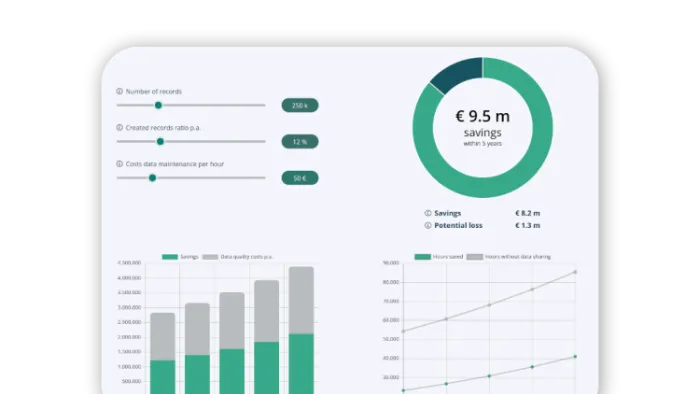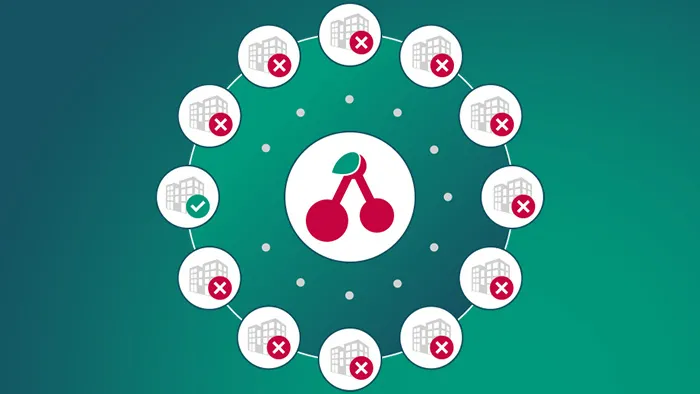When the pain is bigger than the concerns, even conservative companies open up to crazy ideas – like opening up their internal data. This dynamic is the underlying factor behind Data Sharing – companies bonding together to jointly maintain their data because doing it alone is just too tedious.
As more and more companies realize how much potential the idea has, CDQ's Cloud Platform is gaining traction and recognition – with a big boost coming our way.

Imagine the most picturesque corner of Switzerland – Lake Lucerne. Mountains rising out of steep waters, darkness setting in early on a winter day in late 2010. Data management practitioners from large European companies gather around the hotel bar after a long day of workshops, having shared approaches and best practices around improving data quality.
"Suddenly," Kai Hüner, CDQ's CTO, remembers, "one of the experts from Bayer or Nestlé says 'Why is it we all tackle data maintenance alone? We have so many of the same suppliers! Why am I updating a supplier record with a new tax number, and my colleague here in Novartis does the same, and those guys at Syngenta do it as well? That is so painfully inefficient! If only we could share the burden!' The others agreed, and shared many war stories of painful manual data correction and inconsistent executive reports in the following hours."
"If I think back to this evening", Karsten H. Muthreich, retired Head of Data Management at Nestlé and now a thought partner of CDQ, adds, "one of our big challenges at Nestlé in those days was to change the mind set form 'My Data' to 'Our Data' as we were implementing a global master data environment for Customer, Material, and Vendor records. The idea of sharing the maintenance between different partners sounded really attractive. It also supported our idea of harmonized processes – why do we need more complex rules than Novartis, Roche, or Syngenta? This was the starting point to re-design our maintenance processes, and helped us get our mindset to 'Our Data'".
Just as now, CDQ was running the Competence Center as expert community and research consortium on data management, with 15 companies that quickly agreed that this blatant inefficiency made for a great topic to explore. CDQ started the research – how were companies keeping data up to date for business partners like suppliers and B2B customers?
Kai quickly realized that the situation indeed was ripe for innovation: not only was the supplier or customer overlap between companies much higher than initially anticipated (CDQ now typically sees an overlap between 20-60%). The inefficiency was also very costly – deciding which data to trust required a very skilled employee. "I saw people with master's degrees in Engineering pouring over Google Maps, trying to verify a supplier location."
So, the idea was born to pool and better leverage the most expensive data quality "tool" known on earth: human judgment. Why not create a shared data pool where data experts from different companies can collaborate – one person makes an update, a second person validates it, and the entire community can benefit from this? An initial prototype showed promise, but soon, the vast complexities of business partner data emerged: an American and a European trying to decide which legal entity codes are known in Japanese business law? It became very apparent why nobody had built this before.
Undeterred, CDQ expanded the prototype – a growing data quality rules base could soon check legal entity identifiers from all countries on the globe. To further increase the size and quality of the data pool, CDQ started integrating public and official sources, known as reference data. From one time-critical cleansing project to the next, the Data Sharing platform proved its value, with more and more customers from the original "pioneers' club" asking for a subscription model. So, in 2017, CDQ officially launched the platform as a cloud-based software product.
Looking back, Simon Schlosser, CDQ's Head of Product, knows why CDQ was able to pull off this innovation: "We could build on the trust between our data management pioneers from different companies – sharing company-internal data sounds scary to everybody who hears it for the first time, but our experts trusted us and each other. We preserved the trust by baking it into our governance rules – who can see what on the platform? Plus: The pain of manual maintenance was just too big."
Now, a couple of years later, the idea of Data Sharing as the best way to better data has gained much traction – many more companies have joined the CDQ "pioneers' club". They all want to approach data management in a truly strategic way – leveraging knowledge and human judgment from other experts and public sources for their own benefits.
And the world starts to notice. What began as a crazy idea born on an early winter evening in the beautiful Swiss Alps, is now a recognized and successful approach to improving corporate master data.

